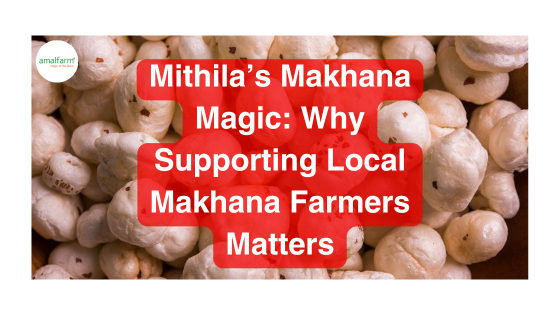
Mithila’s Makhana Magic: Why Supporting Local Makhana Farmers Matters
amalfarm2024-12-29T08:18:59+00:00
Mithila, a land steeped in history and culture, is home to more than just tales of King Janaka and Sita. This region, encompassing Darbhanga and Madhubani districts in Bihar, boasts a rich tradition tied to a unique aquatic crop—makhana. For the people of Mithila, makhana is a way of life—a superfood with deep cultural roots and immense economic significance. Let us learn more about this amazing product today that you must not miss stacking in your kitchen already.
The Origins of Mithila and Makhana

The name Mithila is believed to originate from King Mithi, with his father Janaka lending his name to the title used by successive kings. Among them, Seeradhwaja Janaka, father of Sita, remains the most celebrated. Much like its illustrious heritage, Mithila’s makhana holds a revered status in both Ayurveda and culinary traditions.
The term “makhana” is derived from the Sanskrit word ‘Mak’, which signifies sacrifice. This aligns beautifully with the effort and dedication local fishermen and farmers pour into cultivating this aquatic treasure.
Bihar: The Cradle of Makhana Cultivation

Bihar stands proudly as India’s pioneer in commercial makhana farming. In fact, India is the first country in the world to popularize makhana as a horticultural fruit crop.
This aquatic crop thrives in the stagnant waters of wetlands and ponds, making Bihar’s geography ideal for its cultivation. Among the key regions, Darbhanga and Madhubani districts play a significant role, with local fishermen and farmers sustaining this age-old tradition.
From Pond to Plate: The Journey and Struggles of Mithila Makhana Farmers

Makhana cultivation is an art passed down through generations in Bihar, particularly in the Darbhanga and Madhubani districts. Farmers, often collaborating with local fishermen, dedicate immense skill, patience, and hard work to transform these aquatic seeds into the beloved superfood we know. The process—from sowing in ponds to harvesting and popping the seeds—is painstaking and time-intensive, reflecting their deep connection to this traditional craft.
However, despite their expertise, these farmers face significant challenges. Low market prices, the dominance of middlemen, and limited access to better markets severely impact their livelihoods. While their efforts sustain an age-old tradition, the unequal playing field often leaves them with minimal returns for their labor. Addressing these struggles and supporting small-scale farmers is essential to preserving this heritage and ensuring that their dedication is valued and rewarded.
More Than a Purchase: How Supporting Local Farmers Makes a Difference

When you buy directly from local makhana farmers, it’s more than just a transaction—it’s a lifeline for their communities. By cutting out middlemen, farmers receive fairer prices, empowering them economically.
This support not only uplifts their livelihoods but also ensures the continuation of traditional, sustainable farming practices that have stood the test of time. Every purchase contributes to a cycle of growth, encouraging these communities to thrive while preserving their cultural heritage.
A Bite of Authenticity and Purity

Local makhana isn’t just another snack; it’s a piece of tradition. Unlike mass-produced alternatives, makhana sourced directly from farmers is fresher, richer in flavor, and unmatched in quality. You get to enjoy a product that’s free of excessive processing, ensuring authenticity and purity. Choosing local means savoring something truly special while supporting the people who pour their heart into bringing this superfood to your plate.
Small Steps, Big Impact

Supporting local farmers doesn’t require monumental effort; small actions can make a world of difference. Start by buying directly from farmer collectives or startups that value ethical sourcing and sustainability, like Amalfarm. Based in the culturally rich region of Mithila, Amalfarm works closely with local fishermen and farmers in Darbhanga and Madhubani districts of Bihar to bring you authentic, high-quality makhana.
Mithila, named after King Mithi and known for the tales of Janaka and Sita, carries a deep connection to makhana. Derived from the Sanskrit word “Mak,” meaning sacrifice, makhana reflects both tradition and resilience. Bihar is India’s pioneer in makhana farming, with this aquatic crop thriving in the stagnant waters of its wetlands.
By choosing brands like Amalfarm, you not only enjoy fresh, authentic makhana but also contribute to preserving this heritage. Spread the word, support local, and make a lasting impact.
The Future of Mithila Makhana Farming

Makhana is more than a snack, a legacy of tradition, sacrifice, and resilience. As global demand rises, supporting its cultivation is crucial. Innovations in farming and consumer awareness can secure a sustainable future for this unique crop and the farmers behind it.
By choosing local mithila makhana, we honor Mithila’s rich heritage while promoting healthier lifestyles and sustaining centuries-old traditions. Each bite carries the story of dedication, culture, and the promise of a thriving future.
